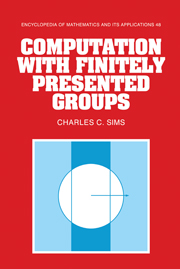Book contents
- Frontmatter
- Contents
- Preface
- Introduction
- 1 Basic concepts
- 2 Rewriting systems
- 3 Automata and rational languages
- 4 Subgroups of free products of cyclic groups
- 5 Coset enumeration
- 6 The Reidemeister-Schreier procedure
- 7 Generalized automata
- 8 Abelian groups
- 9 Polycyclic groups
- 10 Module bases
- 11 Quotient groups
- Appendix Implementation issues
- Bibliography
- Index
5 - Coset enumeration
Published online by Cambridge University Press: 06 March 2010
- Frontmatter
- Contents
- Preface
- Introduction
- 1 Basic concepts
- 2 Rewriting systems
- 3 Automata and rational languages
- 4 Subgroups of free products of cyclic groups
- 5 Coset enumeration
- 6 The Reidemeister-Schreier procedure
- 7 Generalized automata
- 8 Abelian groups
- 9 Polycyclic groups
- 10 Module bases
- 11 Quotient groups
- Appendix Implementation issues
- Bibliography
- Index
Summary
Chapter 4 dealt with finitely generated subgroups of a free product F of cyclic groups. The basic coset enumeration procedure presented in Sections 4.5 and 4.6 allows us to compute the important-coset automaton AI(H) for such a subgroup H described by a finite generating set. In general, coset enumeration is a procedure for trying to find AI(H), where H is a subgroup of F which is finitely generated modulo a normal subgroup N of F. When N is the normal closure of a finite set and H has finite index in F, we can compute AI(H), and as we shall see in Chapter 6, we can find a finite presentation for H/N.
The notation established in Sections 4.1 to 4.10 remains in effect. Thus X is a finite set and R is a classical niladic rewriting system on X*. The congruence on X* generated by R is ∼, and C is the set of canonical forms for ∼. If U is in X*, then [U] is the ∼-class containing U and Ū is the unique element of [U] ∩ C. If x is in X, then x−1 is the element of X representing the inverse of [x]. If U = x1 … xs, then U−1 = x−1s… x−11. If |X| = 1, then F is cyclic of order 2 and we have no trouble studying its subgroups. Therefore we shall assume that |X| ≥ 2.
Information
- Type
- Chapter
- Information
- Computation with Finitely Presented Groups , pp. 217 - 267Publisher: Cambridge University PressPrint publication year: 1994
